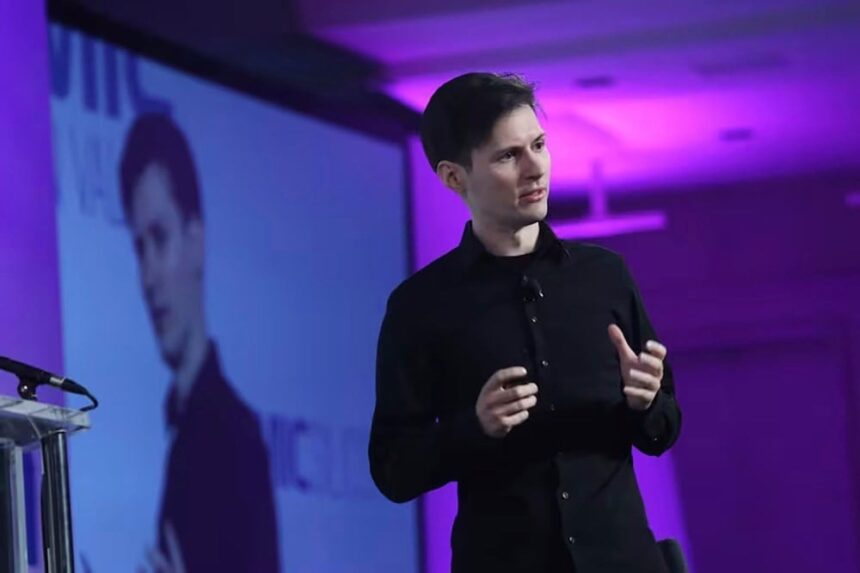Summary by Geopolist | Istanbul Center for Geopolitics:
Pavel Durov, the founder of Telegram, was arrested in France on August 24, 2024, on charges related to serious allegations such as possession of child pornography, money laundering, and organized crime, though he has not been formally charged. The French authorities have taken him into custody for questioning and have the authority to hold him until August 28th, at which point they will determine whether to press charges or release him. The arrest of Durov has ignited a considerable amount of public controversy, drawing attention to the ongoing debates surrounding digital rights, content moderation, and encryption.
Telegram has stood by its practices, asserting that its moderation policies are in line with industry standards and that Durov has no intention of concealing anything. Durov, who is recognized for his advocacy of minimal content monitoring and free speech, has previously stated in interviews that Telegram would address overtly violent or terrorist content; however, he is committed to safeguarding private correspondence and free expression. Telegram’s moderation approach has garnered praise from dissidents, but it has also faced backlash for its role in facilitating criminal activities such as cybercrime and terrorism.
In addition, the detention has resulted in diplomatic tensions, as both Russia and the UAE, where Durov is a citizen, have requested consular access. The detention has been condemned by Russian officials, including Kremlin spokesperson Dmitry Peskov, who have characterized it as an assault on freedom of communication. In addition to Elon Musk and Edward Snowden, other prominent figures have voiced their criticism of the move, portraying it as an attack on digital rights.
The French President, Emmanuel Macron, has addressed concerns about censorship by emphasizing that Durov’s arrest is a result of an ongoing judicial investigation rather than a political decision. The arrest underscores the persistent global difficulties in regulating encrypted messaging platforms such as Telegram. These platforms offer a combination of private communication and public broadcasting features with limited oversight.
Read the full article below.
The Geopolitical Fallout of Telegram Founder Pavel Durov’s Arrest
Authorities in France arrested Pavel Durov, the founder and CEO of the messaging app Telegram, on Saturday, sparking a public controversy over online speech, encryption, and digital rights as well as a potential diplomatic fallout in Europe.
Prosecutors in Paris released a list of charges against a “person unnamed” in a criminal investigation in connection with which Durov is being questioned. Those charges include possession of child pornography, money laundering, and association with organized crime. Durov has not been charged but is being detained and questioned; French authorities can keep Durov in custody until Wednesday, at which time they must either release him or charge him with a crime.
Telegram struck a defiant tone in a statement posted to its platform Sunday, saying that its moderation policies were in line with industry standards “and constantly improving” while adding that Durov had “nothing to hide.”
“It is absurd to claim that a platform or its owner are responsible for abuse of that platform,” the company said.
Durov, who founded Telegram in 2013 in his native Russia, has long styled himself as a champion of unfettered free speech online. The platform has adopted a lighter-touch approach to content moderation than many of its social media peers, even as it has grown to nearly a billion global users.
“Unless they cross red lines, I don’t think that we should be policing people in the way they express themselves,” Durov told the Financial Times in a rare interview in March this year, saying the platform planned to improve its content moderation without elaborating on what he considers a red line.
In another interview in April with right-wing media personality Tucker Carlson, Durov said the company would cooperate with “legitimate” demands to take down content.
“If there was a group of people who were promoting violence, there was terrorist activity that was spreading violence in some parts of the world, publicly posting things that any decent human being would disallow or wouldn’t want to be posted, we would help them,” he said. “But in some other cases where we thought it would be crossing the line, it wouldn’t be in line with our values of freedom of speech and protecting people’s private correspondence, we would ignore those.”
That approach has seen Telegram being used by protesters and dissidents around the world as well as the authoritarian governments they are often fighting against, and it has become a leading source of information and intelligence in the Russia-Ukraine conflict.
Despite Russia’s historical baggage with Durov and Telegram (the Russian government unsuccessfully tried to ban the app in 2018), the country’s military has become dependent on the app for battlefield communication as well as propaganda in support of Russian President Vladimir Putin. “In the last two years of the war, no platform has played a greater role in helping us get insight into Russian thinking about the war than Telegram,” said Eto Buziashvili, a Tbilisi, Georgia-based researcher with the Atlantic Council’s Digital Forensic Research Lab.
Multiple Russian officials have expressed outrage at Durov’s detention. Unless France provides strong evidence to back up its claims, “we are witnessing a direct attempt to restrict freedom of communication and, one might even say, direct intimidation of the head of a large company,” Kremlin spokesperson Dmitry Peskov told reporters in a briefing on Tuesday, adding that Moscow is “ready to provide all necessary assistance and support” to Durov.
Durov’s arrest was also slammed by X owner and fellow tech billionaire Elon Musk—who has espoused a similarly unbridled approach to online speech and is engaged in his own content moderation fight against European authorities—as well as former U.S. National Security Agency whistleblower Edward Snowden, who called it “an assault on the basic human rights of speech and association.”
French President Emmanuel Macron sought to quell accusations of government censorship on Monday, pushing back in a post on X against what he referred to as “false information” about Durov’s arrest. “The arrest of the president of Telegram on French soil took place as part of an ongoing judicial investigation,” Macron wrote. “It is in no way a political decision.” He also added that France remained “deeply committed to freedom of expression and communication, to innovation, and to the spirit of entrepreneurship.”
Both Russia and the United Arab Emirates (UAE) have requested consular access to Durov. Durov is a citizen of both countries as well as France. A spokesperson for the UAE foreign ministry said the country is “closely following” his case.
Durov has a complicated relationship with Russia, having fled the country in 2014 after refusing (in his own telling) to share data from VK—another hugely popular social network that he founded—with the Russian government. He sold his stake in VK and eventually moved to Dubai, where he has largely been based since and where Telegram is now located.
But the geopolitical implications of Durov’s arrest go beyond his citizenships. Countries around the world, particularly in Europe, have been grappling with how to regulate social media platforms such as Facebook, Instagram, X, and TikTok, attempting to draw the line between free expression and illegal content. Governments in many cases have also sought to break through the end-to-end encryption provided by messaging services such as WhatsApp and Signal to protect user privacy, citing a need to police potentially illegal content.
Telegram sits at the intersection of both of those debates. It allows users to exchange private messages (though its encryption is somewhat weaker than other messengers) while also letting them create public broadcast channels that function more like social networks, albeit with far less content moderation.
“In a lot of use cases around the world, especially where we see the use of Telegram in conflict zones and for broader public messaging, it very much hedges more toward a social media app than a point-to-point communications app,” said Graham Brookie, vice president for technology programs at the Atlantic Council and senior director of the Digital Forensic Research Lab. “Telegram has very intentionally taken a very, very light touch to what the rest of the industry would refer to as trust and safety or content moderation,” he added.
That combination of privacy and lax oversight has made the platform a haven for bad actors, including cyber criminals, drug dealers, and even terrorist groups such as the Islamic State.
France appears to be taking issue with multiple aspects of Telegram’s model, calling out the illegal activity and content available on the platform in its statement on Monday detailing the charges against the “unnamed” person that Durov is being questioned about, which include three charges related to “cryptology” and the provision of encryption services.
But the broad nature of the charges and the lack of detail from the French government leave room for the case to be distorted in the public eye, according to Brookie. “We’re in this dangerous gray area where a lot of projection can be put onto whatever the reason [is] for his apprehension in France,” he said.
Durov’s arrest and the conversation around it could create misconceptions about encryption and hurt activists and dissidents around the world who rely on encrypted messaging for safety, said Mallory Knodel, a researcher at New York University who studies cryptography. “These kinds of violations could happen on any platform … and these alleged crimes are not related to whether the service is encrypted,” she said. “I do worry about this sort of perception of encrypted applications as being a place that enables these kinds of crimes to be committed.”
And despite the proliferation of harmful content on Telegram and what she terms a lack of “duty of care” for vulnerable users on the part of its leadership, Knodel said arresting a technology executive for content shared on their platform sets another dangerous precedent.
“Arresting a CEO is a harsh measure in any country,” she said. “It’s definitely an extreme measure, and it feels like it’s intended to send a message.”
By Rishi Iyengar
Source: Foreign Policy







